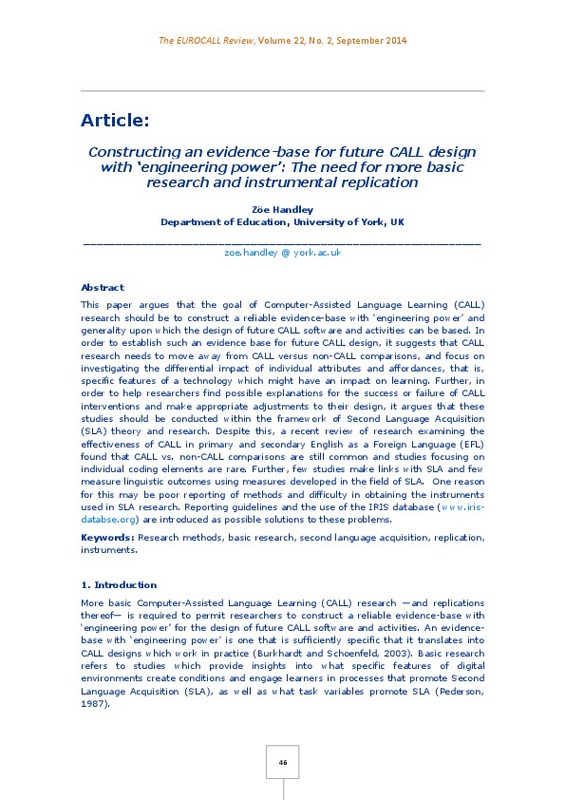JavaScript is disabled for your browser. Some features of this site may not work without it.
Buscar en RiuNet
Listar
Mi cuenta
Estadísticas
Ayuda RiuNet
Admin. UPV
Constructing an evidence-base for future CALL design with ‘engineering power’: The need for more basic research and instrumental replication
Mostrar el registro sencillo del ítem
Ficheros en el ítem
| dc.contributor.author | Handley, Zöe
|
es_ES |
| dc.date.accessioned | 2017-05-25T12:29:46Z | |
| dc.date.available | 2017-05-25T12:29:46Z | |
| dc.date.issued | 2014-09-25 | |
| dc.identifier.uri | http://hdl.handle.net/10251/81754 | |
| dc.description.abstract | [EN] This paper argues that the goal of Computer-Assisted Language Learning (CALL) research should be to construct a reliable evidence-base with ‘engineering power’ and generality upon which the design of future CALL software and activities can be based. In order to establish such an evidence base for future CALL design, it suggests that CALL research needs to move away from CALL versus non-CALL comparisons, and focus on investigating the differential impact of individual attributes and affordances, that is, specific features of a technology which might have an impact on learning. Further, in order to help researchers find possible explanations for the success or failure of CALL interventions and make appropriate adjustments to their design, it argues that these studies should be conducted within the framework of Second Language Acquisition (SLA) theory and research. Despite this, a recent review of research examining the effectiveness of CALL in primary and secondary English as a Foreign Language (EFL) found that CALL vs. non-CALL comparisons are still common and studies focusing on individual coding elements are rare. Further, few studies make links with SLA and few measure linguistic outcomes using measures developed in the field of SLA. One reason for this may be poor reporting of methods and difficulty in obtaining the instruments used in SLA research. Reporting guidelines and the use of the IRIS database (www.iris-databse.org) are introduced as possible solutions to these problems. | es_ES |
| dc.description.sponsorship | IRIS is developed and curated by the Digital Library at the University of York, and directed by Emma Marsden (York, UK) and Alison Mackey (Georgetown, USA / Lancaster, UK). It is funded by the Economic and Social Research Council and the British Academy. The author would like to thank the IRIS team for supporting attendance at EUROCALL 2014 where an earlier version of this paper was presented, and in particular Emma Marsden for her suggestions on how to improve the paper. | |
| dc.language | Inglés | es_ES |
| dc.publisher | Universitat Politècnica de València | |
| dc.relation.ispartof | The EuroCALL Review | |
| dc.rights | Reconocimiento - No comercial - Sin obra derivada (by-nc-nd) | es_ES |
| dc.subject | Research methods | es_ES |
| dc.subject | Basic research | es_ES |
| dc.subject | Second language acquisition | es_ES |
| dc.subject | Replication | es_ES |
| dc.subject | Instruments | es_ES |
| dc.title | Constructing an evidence-base for future CALL design with ‘engineering power’: The need for more basic research and instrumental replication | es_ES |
| dc.type | Artículo | es_ES |
| dc.date.updated | 2017-05-25T10:54:43Z | |
| dc.identifier.doi | 10.4995/eurocall.2014.3634 | |
| dc.rights.accessRights | Abierto | es_ES |
| dc.description.bibliographicCitation | Handley, Z. (2014). Constructing an evidence-base for future CALL design with ‘engineering power’: The need for more basic research and instrumental replication. The EuroCALL Review. 22(2):46-56. https://doi.org/10.4995/eurocall.2014.3634 | es_ES |
| dc.description.accrualMethod | SWORD | es_ES |
| dc.relation.publisherversion | https://doi.org/10.4995/eurocall.2014.3634 | es_ES |
| dc.description.upvformatpinicio | 46 | es_ES |
| dc.description.upvformatpfin | 56 | es_ES |
| dc.type.version | info:eu-repo/semantics/publishedVersion | es_ES |
| dc.description.volume | 22 | |
| dc.description.issue | 2 | |
| dc.identifier.eissn | 1695-2618 | |
| dc.contributor.funder | Economic and Social Research Council, Reino Unido | |
| dc.contributor.funder | British Academy |








